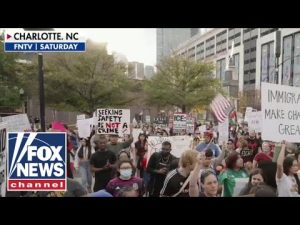In the latest development from Charlotte, North Carolina, a significant federal operation has stirred up a mix of emotions and political tussles. The Department of Homeland Security (DHS) has rolled out Operation Charlotte’s Web, a bold initiative aimed at targeting criminal illegal migrants in the Tar Heel State. As the operation kicked off, federal agents wasted no time making arrests, igniting protests across the region. But while local Democratic leaders are quick to cry foul, possibly making some craft metaphorical drama akin to the closing act of a Shakespearean play, the underlying objective here is clear: to ensure the safety of American citizens.
It’s a familiar scene these days. The mayor and various community leaders in Charlotte have expressed their distaste for the presence of federal agents, claiming their actions sow fear and division rather than security and protection. Ah, the classic gambit—when in doubt, paint federal law enforcement as the fearsome villains in this unfolding saga. They stand on their soapboxes, decrying that residents are not made any safer by these measures, while simultaneously dismissing the notion that these operations are smartly targeting violent criminals.
Segue to the protests that erupted over the weekend with an energy that speaks volumes. Armed with placards and chants, the demonstrators stood firm in their belief that the crackdown doesn’t align with quintessential American values. They marched in what was coined a “No Border Patrol in Charlotte” rally. It’s somewhat amusing that those parroting the refrain of being on the side of what America stands for often forget that a fundamental aspect of any nation is the security of its borders.
Meanwhile, DHS stood resolute, articulating the purpose of the operation: it’s about ensuring public safety. They pointed a finger at the city’s sanctuary policy, a policy that, in their view, has prevented about 1,400 detainers from being honored. It’s a classic case of unwilling enablers acting surprised when their lax policies meet federal enforcement. Imagine that—inviting chaos only to be shocked when someone arrives to clean up the mess.
Charlotte isn’t alone in this; similar operations have been executed in other cities like Chicago and Memphis. It’s part of a broader effort to address illegal activities and uphold the law. But as the debates rage on in Charlotte, one thing’s for sure: when ideological theatrics overshadow pragmatic law enforcement, the lines between security and spectacle can get blurry. One might suggest grabbing some popcorn; the next act is surely worth a watch.







